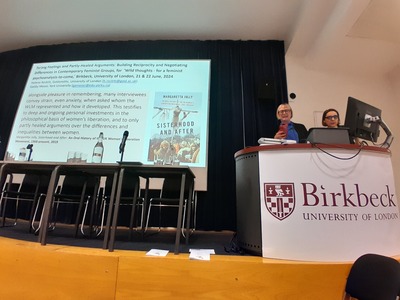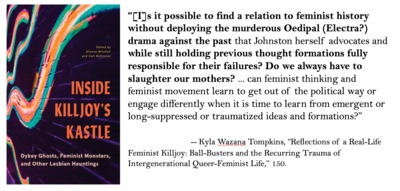Strong Feelings and Partly-Healed Arguments: Building Reciprocity and Negotiating Differences in Contemporary Feminist Groups
Reckitt, Helena and Moser, Gabrielle. 2024. 'Strong Feelings and Partly-Healed Arguments: Building Reciprocity and Negotiating Differences in Contemporary Feminist Groups'. In: Wild thoughts - for a feminist psychoanalysis-to-come. Site for Contemporary Psychoanalysis, Birkbeck, University of London, United Kingdom 21-22 June 2024. [Conference or Workshop Item]
![[img]](https://research.gold.ac.uk/37229/6.hassmallThumbnailVersion/Strong%20Feelings%20and%20Partly%20Healed%20Arguments_Helena%20Reckitt%20presenting%20talk%20coauthored%20with%20Gabrielle%20Moser_%E2%80%98Wild%20thoughts%2C%20for%20a%20feminist%20psychoanalysis%20to%20come%2C%E2%80%99%20Birkbeck%2C%2022%20June%2C%202024.jpg)
|
Image
Strong Feelings and Partly Healed Arguments_Helena Reckitt presenting talk coauthored with Gabrielle Moser_‘Wild thoughts, for a feminist psychoanalysis to come,’ Birkbeck, 22 June, 2024.jpg - Other Available under License Creative Commons Attribution Non-commercial. Download (1MB) | Preview |
|
![[img]](https://research.gold.ac.uk/37229/7.hassmallThumbnailVersion/Strong%20Feelings%20and%20Partly%20Healed%20Arguments_slide%20from%20talk%20by%20Gabrielle%20Moser%20%26%20Helena%20Reckitt%2C%E2%80%98Wild%20thoughts%2C%20for%20a%20feminist%20psychoanalysis%20to%20come%2C%E2%80%99%20Birkbeck%2C%2022%20June%2C%202024.jpg)
|
Image
Strong Feelings and Partly Healed Arguments_slide from talk by Gabrielle Moser & Helena Reckitt,‘Wild thoughts, for a feminist psychoanalysis to come,’ Birkbeck, 22 June, 2024.jpg - Other Available under License Creative Commons Attribution Non-commercial. Download (1MB) | Preview |
|
![[img]](https://research.gold.ac.uk/37229/8.hassmallThumbnailVersion/Strong%20Feelings%20and%20Partly%20Healed%20Arguments_slide%20from%20talk%20by%20Gabrielle%20Moser%20%26%20Helena%20Reckitt%2C%E2%80%98Wild%20thoughts%2C%20for%20a%20feminist%20psychoanalysis%20to%20come%2C%E2%80%99%20Birkbeck%2C%2022%20June%2C%202024_2.png)
|
Image
Strong Feelings and Partly Healed Arguments_slide from talk by Gabrielle Moser & Helena Reckitt,‘Wild thoughts, for a feminist psychoanalysis to come,’ Birkbeck, 22 June, 2024_2.png - Other Available under License Creative Commons Attribution Non-commercial. Download (1MB) | Preview |
Abstract or Description
In Sisterhood and After, her 2019 book about the UK women’s liberation movement, Margaretta Jolly reflects on the strong emotions captured in oral history interviews with feminist activists. Beyond expressing their anger at male-domination and ingrained sexism, what stands out is the intensity of women’s feelings about one another. Painful memories of racism, class privilege, and division in the women’s movement produce moments of “discomposure,” and expressions of such “uncivilised” emotions as shame, guilt, jealousy, boredom, and competition. Testifying to “deep and ongoing personal investments in the philosophical basis of women’s liberation,” feminists’ discomposure nonetheless speaks to “partly healed arguments over the differences and inequalities between women.”
Jolly’s account of difference and dissent is a far cry from utopian images of feminist solidarity and support. Yet the faultlines of ideological and cultural division that she describes are, if anything, even more evident in today’s polarised feminist cultures. Contemporary clashes between feminists increasingly play out online, prompting calls to cancel difficult or outmoded voices. This toxic environment threatens the grounds for reciprocal understanding, the ability to tolerate ambivalent accounts of past feminisms, and the potential to build future political alliances.
In this talk Gabrielle Moser and Helena Reckitt reflect on ways in which they have attempted to work across differences, of generation, nationality, ability, cultural heritage and experience, in feminist groups they have co-run for almost a decade: EMILIA-AMALIA Feminist Working Group in Toronto, and the Feminist Duration Reading Group in London. They share how their groups have devised events and organisational structures, including those informed by earlier feminist practices, in order to build feminist exchange. They explore how past feminist engagements with psychoanalytic theory —including the use of group analysis, consciousness-raising, free association writing and dream narration — have helped to foreground the often repressed feelings of resentment, conflicting desire, and complicity inherent to group dynamics.
Acknowledging ‘bad feelings,’ including rivalry and frustration, anger and disappointment, that emerge in group work, Moser and Reckitt address how they have attempted to deal with tensions and conflict, around opposing ambitions and priorities, public recognition versus collective efforts, division of labour, and the demands of host institutions. Returning to Jolly’s use of oral history to tell complex feminist stories, they reflect on their efforts to build the muscles of reciprocal understanding through conducting oral history interviews and hosting listening parties.
|
Item Type: |
Conference or Workshop Item (Talk) |
||||||
| Additional Information: |
The talk was given as part of a panel on Feminism and the Arts. Other panellists were artists Ruth Novaczek and Anahita Rezvani and art historian Alexandra Kokoli. The panel was chaired by Luisa Pretolani. Conference Description: Wild Thoughts - for a feminist psychoanalysis-to-come,’ “Every desire has a relation to madness” (Irigaray). “Women suffer from drives without any possible representatives or representations”. (Irigaray). We are not done with Patriarchy. Psychoanalysts with a political consciousness and an attentive, non-patriarchal ear know this better than anyone else. It creeps into our analytic space, the so-called ‘safe space’, we become witnesses to the suffering of life, to oppression and violence, to the colonisation of the psychic life by a neoliberal ‘progressive’ regime that wishes to prolong patriarchy through a phallic over-signification that reproduces a culture of sameness. Gender trouble does not seem to trouble enough, and the phallocentric gender pluralism gets along very well with a neo-liberal discourse. The numerical multiplication of gender options does not seem to take us away from the political economy of sexual dialectics. The binary machine is as present as ever, bigger and stronger, since the array of dichotomies has expanded and has become capable of signifying even the in-between, grey zone. It has also implanted deadly antagonisms within the current landscape of identity politics. Divide and conquer – patriarchy renders itself invisible, internalised, accepted, even celebrated. Successful displacement. A feminist revolution will not take place in the repetition of language, in the cracks of regulative discourses, but in ‘the liberation of forces’: in the wild thoughts of psychoanalysis! This conference does not contain itself in the fossilised position of the minority that produces resentment, negative critique and reactive resistance wrapped in claims for recognition. The political imperative is no longer to resist through negation, but to resist through affirmation, creation, playfulness, imagination, where the unconscious is perceived as a generative creative power, rather than reduced solely to the neurotic sick unconscious. Desire is not lack and to desire is not to long for something. Desire is the desire to produce new ways of feeling, of perceiving and conceiving, new ways of relating that are not reduced to phallologocentric articulations of a monosexual culture, but wishes instead to promote an assemblée of dissident feminist subjectivities. Wild analysis, wild desires. Resistance always lies on the side of the analyst: can we re-invent a ‘minoritarian psychoanalysis of the unconscious’ that centres on the excluded other (to name a few: the feminine, the animal, nature, the racialised other, the sexual dissident, the Indigenous) within a posthuman/post-anthropocentric framework? The conference for a Feminist psychoanalysis-to-come wishes to give back to psychoanalysis the response-ability as the ability to respond (differently). Psychoanalysis is a deeply political and ethical project since it centres around our ability to listen to, and to intervene over, psycho-social reproductions (of the power and the norm). A failing to inscribe the plural and powerful contributions of feminist praxes into the psychoanalytic vocabulary, means a losing sight of the unconscious itself. |
||||||
| Departments, Centres and Research Units: |
|||||||
| Dates: |
|
||||||
| Event Location: |
Site for Contemporary Psychoanalysis, Birkbeck, University of London, United Kingdom |
||||||
| Date range: |
21-22 June 2024 |
||||||
| Item ID: |
37229 |
||||||
| Date Deposited: |
08 Jul 2024 09:47 |
||||||
| Last Modified: |
08 Jul 2024 09:47 |
||||||
|
URI: |
View statistics for this item...
 |
Edit Record (login required) |

 Tools
Tools Tools
Tools


